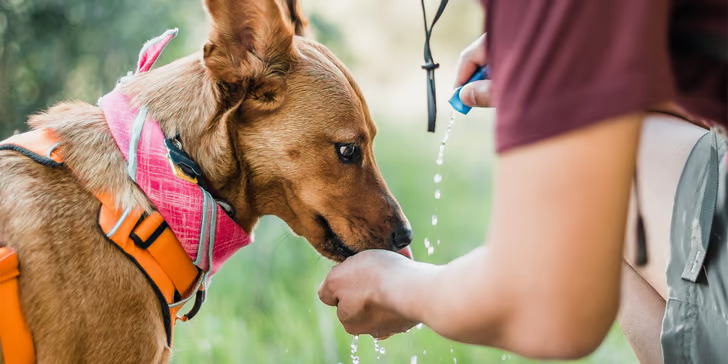
If you see that your older dog is drinking water more than his or her usual limit, then it can be a thing of concern. Also, check that isn’t just happening during hot summer days or when you’ve been exercising. It could mean that something is wrong due to your dog’s aging. Although some drinking increase is normal for older dogs, however, excessive thirst could be an indication of serious health issues. If your pet’s age suddenly appears to be thirsty, it’s crucial to determine the cause immediately.
Let’s look at why senior dogs start gulping down gallons of water, and when you need to rush them to the vet clinic for help.
How Much is Too Much Water for Dogs?
First, how do you know if your senior pup is just drinking a bit more, or if it’s excessive? Here’s a general guideline:
- Adult dogs need about 1 ounce of water per pound of body weight per day.
- Senior dogs may drink up to 50% more than when they were younger.
- If your dog is guzzling way above their normal amount, take note.
Also, look for frequent trips to the water dish. Accidents in the house from peeing more. And watch if they seem obsessed with water.
Read More: How Many Seizures Can A Dog Have Before It Dies?
What’s Making Your Old Dog So Thirsty?
A few common diseases and conditions can cause older dogs to desperately drink lots of water. Two biggies are:
Kidney Failure: The kidneys of a sick dog can’t conserve water, as well. This means that your dog drinks more, but they also pee. You may observe urine that smells or is cloudy as well.
Diabetes: can cause excessive thirst and urination. Your dog’s body can’t regulate blood sugar, so they flush out all the glucose.
Some other reasons for excessive drinking include:
- Liver or thyroid disease
- Cushing’s disease – hormone imbalance
- Infection
- Certain medications
- Pain or fever
- Cancer
- Anxiety
See why it’s so important to figure out the cause? The treatment depends on the specific problem.
Read More: How To Treat Dandruff In Dogs Naturally?
What to expect at a veterinary visit?
If your dog’s aging companion is consuming water at a rate that exceeds the amount they normally consume and is unable to stop, a visit to the vet for a test is essential.
Advanced imaging methods like ultrasound or X-rays allow the vet to examine internal organs and check for any stones, masses abnormalities, alterations, or any other changes which require further investigation. The urinalysis test is also crucial in that analyzing the urine is a good indicator of the possibility that infection, disease, or another issue causes stress to the bladder and kidneys that could cause excessive thirst.
By combining the data through these various tests, your vet can put together the diagnostic components to identify what’s causing your senior dog to drink more than usual to ensure that the appropriate treatment is initiated.
Read More: How To Treat Dog Ear Infection Without A Vet?
Top Tips to Help Your Vet
You know your dog best. So give your vet detailed info to help them solve the puzzle:
- When the increased drinking started
- How much more they’re drinking
- Any other symptoms you notice
- Medications they take
- Personality or appetite changes
Go in prepared with specific observations. It can aid in diagnosis.
Treatment Plan to Get Your Senior Hydrated Right
Once the underlying cause is found, the vet will recommend a tailored treatment plan. Like:
- Medications to treat infections, diabetes, Cushing’s, etc
- Diet change for kidney or liver disease
- Surgery to remove tumors or uterine infections
- IV Fluids to rehydrate if dehydrated
The goal is to address the disease-causing excessive drinking, not just the symptoms. This helps get your pup feeling back to normal.
Read More: Got An Itchy Pup? 8 Soothing Home Remedies
Working Together to Keep Your Old Dog Healthy
Aging dogs need some extra care and attention. If you notice increased thirst, call your vet so they can discover the reason and get your senior dog back to feeling their best. You just need to be calm about the whole situation, but you also need to be alert and inform the doctor if you see any warning signs.
Always remember early detection is the key to quitting treatment. By being cautious and monitoring your dog you can keep your older dog happy and healthy.
If you’re looking for tips on how to treat dog ear infections without a vet, there are home remedies you can try, but always be cautious and consult a professional if the condition worsens.
Read Also Here
- What Home Remedy Can I Give My Dog for Vomiting?
- 30 Allergy-Friendly Dogs That Are Perfect for Sensitive Pet Lovers










